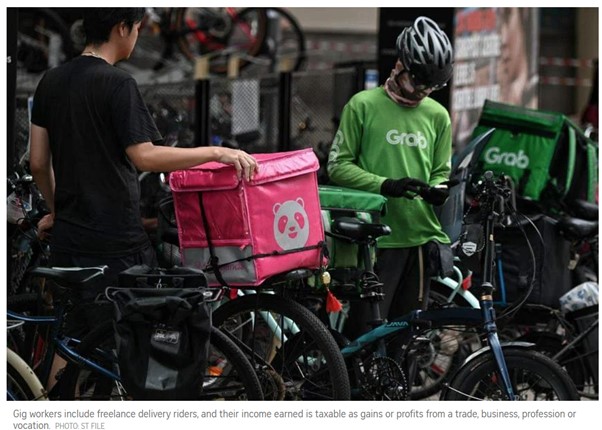Blog

Hiring Independent Professionals Need Not Be Painful
Written by Luke Thomas
In the previous article titled, “More Companies Are Using Marketplaces To Find Freelance Professionals”, we discussed the benefits of hiring independent contractors for unique tasks that do not require a full-time employee, recalling the impressive growth of the contingent (flexible or gig) workforce.
While the growth statistics, around the world, of the contingent working trend are promising, many smaller companies are still reluctant to hire flexible workers, even when they have the most to gain.
Freelancers and consultants can significantly widen the talent pool of companies, but that also means they have to spend more time sifting through a heap of applications. And someone may interview well across a computer screen, but how can you be sure they’re as qualified as they say they are? Can you really trust giving someone you’ve never met before access to your systems and data?
These are all valid concerns. Concerns that freelancing platforms must address today, as e-commerce platforms once had to convince customers to part with credit card details. SMEs can tap into the following strategies and reasons to step up their use of independent contractors.
Cost: What do Freelancers cost?
Even if a Freelancer is hired to complete a short-term task, usually urgent, and then costs no more, hirers fret that there may be more cost-competitive ways to achieve their aims.
Freelancers have no source of ‘employee benefits’ and must therefore pay for their own healthcare, insurance and old-age funding security all on their own. They spend constantly to stay updated with training and conference attendances to keep their edge honed. And then there are those slack periods between gigs during which creditors, mortgage and car payments, kids and life do not hold off calling to be fed. Freelancers must put side money for downtimes, so hirers pay for uncertainty as well.
Does all of that add up to more cost for the employer than an in-house employee? It might appear that way if you simply compare salaries with hourly charges.
But wait; calculate the cost of the real-estate that is laid out for employees, HR support, Employer CPF contributions and the full costs of Employee Benefit Programs, none of which freelancers can obtain. Now compare the costs. No contest: the freelancer is cost competitive.
So, should the smart money would simply employ experts in-house and then fire them when they are not needed? You would cost less. Sadly, this strategy fails if you consider labour law, the impact on your remaining staff’s sense of job-security and the cost of recruitment when a prospective employee or consultant checks your reputation on Glassdoor.
Smart money being tireless, has not yet given up on discovering more ingenious cost-paring approaches for their short-term hire needs. It turns out there is one.
What if you hired a recently retired expert?
By continuing to work, should-be-retirees immediately reduce the drain on their retirement savings, which makes that nest-egg last longer. That is the primary cost-benefit evaluation for Geriactives (a portmanteau word that describes today’s seniors better than its root, ‘geriatric’).
They already have retirement nest-eggs and healthcare insurance is paid-up or supported by senior-care subsidies. Most of all, their kids are grown and the house paid for; so the only alligators snapping at their ankles are comfortable Crocs.
With those risks of unemployment taken care of, seniors love their down-times as much as they do working. They have no need to price for uncertainty. Net result, the hirer gets a more experienced but lower cost expert to fill the current work-gap.
The smart money today is hiring Geriactives.
Pain-point : The hiring process is difficult and long
A benefit of being open to hiring freelance talent as well as full-time employees is that you’re likely to be sorting through a larger pool of qualified people applying for your job or project. But that also means your team must sift through all those additional responses which can extend the hiring process.
You can reduce your applicant selection workload by writing clear and detailed job descriptions for employee positions and precise project or job-scopes for freelance talent, to ensure that you only attract the right people and reduce the number of unqualified applicants.
The scope description does not need to be lengthy; it just needs to be specific. So, before typing a single word, first create a mental model of what the ideal person looks like. You may want to consider questions like:
What previous work experience should they have? Someone who’s shown they deliver excellent work may indicate they have the discipline, communication and organizational skills to succeed.
What time zone or country may they be in? This may be a factor if you’re creating a workflow that permits remote working.
What makes them excited about doing the work they do? People can feel lonely and isolated working alone on the conference table, when the rest of the team has bunched-together desks and common areas to congregate. This could affect productivity. So plan for face to face team integration and social interaction in establishing your project. This is best done in-person, not over Zoom. Successfully create that sense of teamwork and see productivity rise. Add these factors to your scope description.
Freelancing platforms facilitate posting jobs with access to online ‘wizards’ that step you through the scope writing process to ensure that your job description includes all of the fundamentals. These resources are especially helpful when seeking skills you’ve never hired for before.
Pain-point: Communication with Freelancers is difficult to sustain
Time zone differences can make scheduling interviews and live assessments challenging, because the communication is asynchronous. Much of it necessarily happens through email and chat platforms to accommodate the time-lag between responses because of conflicting schedules and possibly differing time zones.
Good freelancing platforms offer built-in communication tools to help you keep correspondence flowing contiguously (in an unbroken flow), on the same channel. The platform should enable meeting scheduling, real-time chat, file-sharing and video chats between you and the prospective contractor. The tool saves all your interaction with each person to ease communications tracking.
Pain-point: It’s difficult to identify a trustworthy freelancer
Searching for talent online can sometimes feel like the throw of dice. The person may perform well at the interview and come across as passionate about the company’s mission. That may not, however, be enough to ease natural concerns like: Is the person really who they say they are? Are they as skilled as they claim to be? Are they a data/secrecy risk, confidentiality under-taking notwithstanding?
These concerns are reduced with in-house employees who depend on their one job for income whereas Freelancers have multiple sources of income.
Careful freelancing platforms can help you make more confident choices by providing several ways to help qualify independent talent.
In Singapore, look for platforms which deploy Singpass identity verification on all their membership. Their service providers have been identity-verified to high standards while the better platforms also facilitate and encourage their providers to upload evidence of their qualifications and previous work.
Contingent professionals therefore should not pose any higher risk than new employees, while the platform’s rating system, if reliable, can tell you plenty more about attitude, ability and reliability. More on that following.
Pain-Point: How hold a remote worker accountable?
Independent professionals are business owners in their own right, whose reputation directly and immediately impacts their ability to be selected over competing experts on these platforms.
Short-term workers have no choice but to always do their best work and deliver on schedule, before they can ask you for that all important 5-star rating. Screw up and their rating on the platform drops immediately.
On our platform, you can confirm a person’s work history and capabilities by reviewing their job ratings from previous projects done through the platform. Don’t only look at their ratings. Read the comments given to each Provider as well.
Greygigz also offers matching Providers to hirer searches in the order of the highest ratings first, which makes the rating a prime factor to aid selection by Hirers.
GreyGigz additionally provides our service Providers space to upload testimonials, qualifications and samples of their previous work in their showcases, which should also give hirers some insight into the Provider’s history before joining this platform.
Freelancing platforms are public, which adds to the pressure for Providers to give their best or lose their ratings. GreyGigz does SingPass verification of all its Providers so legal recourse is nearly impossible to evade, making our Providers that much more vigilant.
A final note. Our providers are mature and so deeply experienced in the ways of the world that they are acutely aware of the relationship between their work and the rewards they earn. Geriactives have also had a lifetime to learn that Singapore is a very small and well-run place, where reputations won or lost have wide and lasting impact.
Pain-point: Cyber-security risks increase with contingent workers
Security risks can come from anywhere, whether through an employee working in the office, or an independent professional working remotely. The reality is, even if your company has called everyone back into the office, you will still be exposed to remote work. See our precursor article titled: “More Companies Are Using Marketplaces To Find Freelance Workers”; to keep workers from joining the ‘Great Resignation’, flexible workplaces have become an expected benefit.
They log into systems from their personal devices at home or on commutes from work. They may check email outside of business hours using a public Wi-Fi network. Hackers have developed more sophisticated ways to deceive employees with email scams to spread malware.
However, you are no more exposed to these risks with remote or contingent working professionals than you are with your own employees. Thus, it is always good practice to maintain updated security protocols for your entire workforce: onsite, remote, employees, and independent contractors.
Reputable freelancing platforms are keenly committed to keeping their and your data secure. Given the fact that their platforms are constantly accessed by visitors, their cyber-security standards and safeguards are likely to be continuously stress tested and updated to retain integrity. GreyGigz’ plans for its system security to include:
-
Payments are received and remitted on the PayNow platform, ensuring that our customers’ credit card and banking information is not stored on our platform, thus avoiding the risk of dissemination;
-
A safety program to leverage machine learning to detect malicious behaviour from clients and freelancers;
-
Privacy practices follow Singapore’s Personal Data Protection Act and international regulations such as the EU’s General Data Protection Regulation (GDPR).
-
Robust Know-Your-Customer and Anti-Money Laundering programs.
-
Use of secure third-party (AWS, Azure and Google Drive) cloud platforms for file transfers between our Hirers and Providers, thus benefitting from those platforms security scans as well.
Don't put it off. Think of hiring Contingent Professionals as buying time.
Ongoing talent shortages make it difficult to put off hiring freelancers much longer.
As we’ve shown above, freelancing platforms have worked through the pains that most hirers encounter and established systems to improve the user experience.
It is also important to change how you think of the process or frame it for other managers, while persuading them to take a new approach to obtaining talent. You are not so much hiring a person as buying slices of his time. This is far from the same as bringing someone on full-time, with all the administration, support and resources that entails. Instead, you are buying a slice of expertise. Independent professionals are motivated to give of their best, to ensure repeat custom.
The best way to get started is with a small project. The platforms have the technology to make short work of hiring and they have the systems to protect you. Then as you become more familiar with the platform and working with consultants, you can plan forward for better integration of experts and continegnt workers in your system or for new projects, and you can progress to larger and more complex projects.

A Requiem for Retirement
Written by Luke Thomas

Sequenting: Jettisoning Retirement and financing a multi-stage life
Written by Luke Thomas

Retirement – The lies we tell
Written by Luke Thomas

What for Retirement?
Written by Luke Thomas

Retire beyond work and age
Written by Ashish Marwah

The Rise of Silver Mentors
Written by Ashish Marwah

‘Granny Battering’. We all do it.
Written by Ashish Marwah

A Point of View on Ageism
Written by Ashish Marwah

Bridging Generational Divides in Your Workplace
Written by Debra Sabatini Hennelly and Bradley Schurman

Must Gig-workers Pay Tax?
Written by Prisca Ang, Straits Times

Eligible Platform Workers Get CPF Boost
Written by Chor Kieng Yuit, Straits Times

More Companies Are Using Marketplaces To Find Freelance Workers
Written by Luke Thomas